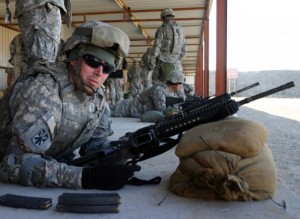Capt. Waldo Galan
Good morning, Brothers and Sisters! I am excited to have been called as a ward military spotlight specialist, and grateful for all of y’all that have sustained me. For my first report I picked the lowest-hanging (but still delicious and of good report) fruit: my husband, Captain Waldo Galan, who is currently serving in the US Army Signal Corps, stationed at Fort Gordon, Georgia.
In a nutshell, tell me your LDS history:
I was born in the church, baptized on my eighth birthday, didn’t so much “fall away” as “ran away” from the church until I met my wife and had a reason to go back to church and search for a testimony. Married in the LA temple, held just about every calling without needing to be a High Priest.
And your military history?
I Joined the Army in 1997, went to Basic Training at Fort Jackson, SC. Had my first deployment for nine months from 2000-20001, went to ROTC at UVU, commissioned as an officer in 2004, and have been a platoon leader, staff officer, and commander.
How do you balance your military and your spiritual life?
A lot of it comes down to integrity. I don’t feel different at church than I do at work. (Part of that being because my ward is pretty salty) but I feel like since I became a leader in the Army I have tried to use the Oath and Covenant of the Priesthood as model by which to lead soldiers. I also pray a lot at work. People will allow around you how you accept them acting around you—if you are okay with racist or dirty jokes, for example, that is what is going to go on around you. But institutionally, the values of the Army and the values of the church are very similar. (Once you get past the whole “killing of enemies” part.)
Do you feel like your testimony has been hindered or helped by your military service?
Absolutely helped. My understanding of what it means to have and use the priesthood is a direct result of my military service. Growing up, we never got a lot of blessings—one for school, one if we were sick—and I think that is probably a lot of peoples’ experience as well. But in the first week of Basic Training, everyone is tired and sick and away from home and a little scared. And on top of missing my wife I was being yelled at every day—because that is what happens at Basic. So we finally got to church on Sunday and the group leader asked if anyone wanted to receive a blessing. A few soldiers lined up and I felt like I wanted a blessing, also. I received a really powerful priesthood blessing and then was asked if I would help assist him—essentially I was assigned to administer priesthood blessings for the entire second hour of church, to any soldier that needed one. And through that consistent, fairly direct communion with the Lord, and through that type of service, I learned how awesome the Priesthood is, how it is designed to be used to support people, and that he loves us enough that he gives us a way to receive such direct guidance. I learned what a great responsibility it is to have the power to act in the name of God on the earth. We healed people, comforted people, and, I am firmly convinced, changed lives. Because my life was changed. The priesthood is the foundation of our identities as LDS men, and so my understanding of and appreciation for and willingness to use the priesthood really comes from those nine weeks. And in the ensuing fifteen years of church and military service—giving blessings in the mud, using the priesthood in hospitals, taking the sacrament in the field—my testimony has only been strengthened and supported.
Is there any advice you’d give to LDS prospective soldiers?
Make sure you get the brown garments. They’ve gotten a lot better. Also, before you go, earn a temple recommend and keep it active, even if you can’t get to a temple. Seeing it in your wallet will remind you that you’ve done something and made commitments and obligations. Look for opportunities to use the priesthood, or to encourage someone to use it—if you feel you need a blessing, ask for it. Finally, I have seen units where there are a large portion of LDS soldiers, and there can be an attitude of “if it’s outside the ward boundaries it doesn’t count.” And this is absolutely not true. Everywhere you are you are an example of both the military AND the church. Someone somewhere is going to know you are Mormon and it WILL come up in conversation down the line. So it is up to you to determine what that conversation will be. You don’t want to hear “Captain Smith can’t be Mormon, because he and I used to get drunk every time we went on a temporary deployment!” Sadly, I have witnessed this many, many times. And it never turns out well.
Waldo is by no means an official representative of the US Army, and his opinions and beliefs are not intended to be taken as US Army statements.


I knew Capt Galan when he was in ROTC at UVU. Nice guy.
I forgot to add, Waldo is by no means an official representative of the US Army, and his opinions and beliefs are not intended to be taken as US Army statements.
Richie, may I make a suggestion? For an episode around Veteran’s Day this year (every year?) you should interview members of the Church who have served/are serving in the military. I can make a couple of suggestions of some interesting people you would enjoy talking to. Maybe I should e-mail you instead of just posting a comment…